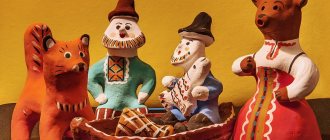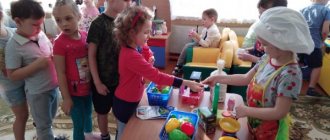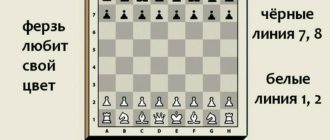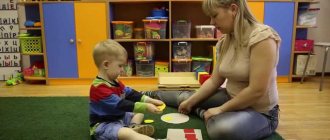MAGAZINE Preschooler.RF
Report “Introducing preschool children to the origins of Russian folk culture”State preschool educational institution kindergarten No. 19 of a combined type, Krasnoselsky district of St. Petersburg
Author: Telesheva G.N. teacher of the highest qualification category
In modern practice of preschool education and family education, there is an active revival of the principle of national education, which involves introducing children to the foundations of their native culture, to the traditions of their people.
One of the principles of the Federal State Educational Standard for Preschool Education is cognitive development, which includes a section - introducing children to sociocultural norms, traditions of the family, society and state.
The conscious formation of moral and ethical feelings should begin from the middle group. The preparatory stage can be considered the work carried out in the junior group.
The purpose of this work is to educate preschoolers with patriotic feelings through introducing children to the origins of Russian folk culture.
To achieve this goal, the following tasks are envisaged:
- To instill in children a sense of love, duty, responsibility, respect for beauty, kindness, affection for their homeland, native places, and the Russian people.
- Develop the ability to restore connections between the past, present and future.
- To develop in the child the ability to understand the culture of his people and a positive attitude towards the culture of other peoples.
- To introduce national life; Russian folk art; Russian folk games; with traditions and holidays.
The formation of moral and ethical feelings, the cultivation of love for the Motherland, for the traditions of Russian folk culture is based on well-known principles:
- the principle of intimacy, objectivity, emotional richness - the proposed material should be gradually more complex;
- principle of accessibility - the information offered is adapted to the perception of preschool children;
- the principle of clarity and entertainment - educational material should arouse interest and emotional response in children;
- the principle of historical sequence of generalizing factors;
- the principle of an integrated and integrative approach - the introduction of preschoolers to the origins of Russian folk culture is carried out through various types of activities in the educational process system, the use of various types and forms of interaction with children is proposed (GCD, play activities, excursions, holidays, theatrical and independent activities);
- the principle of close cooperation between teachers and parents.
The expected result based on the results of mastering all areas for the preparatory group:
Child:
- Knows the basic literary concepts of folklore; a summary of the literary works read; life and traditions of the Russian people; folk holidays; songs, ditties, nursery rhymes, riddles, proverbs, sayings, chants.
- Knows how to tell Russian folk tales, nursery rhymes and act them out;
- Uses household items of the Russian people in the game;
- Creates creative works based on folklore works.
So, where should you start getting acquainted:
- The first direction involves getting to know the national way of life. As a result, children begin to understand the essence of Russian folk culture, its peculiarity, originality, and flavor. Work continues to create an atmosphere of national life; together with the children, the mini-museum of Russian everyday life items organized in the group is replenished. It is known that surrounding objects have a great influence on the formation of a child’s mental qualities - they develop curiosity, cultivate a sense of beauty. Surrounding objects that awaken a child’s soul for the first time and instill in him a sense of beauty must be national. This allows children from a very early age to understand that they are part of the great Russian people.
- The second direction is that preschoolers continue to get acquainted with Russian folk art, complementing and deepening their knowledge. New sections are being introduced : “Getting to know Russian folk costume” , “Getting to know Russian folk cuisine”, etc., expanding children’s understanding of Russian folk culture.
- The third direction is for children to get acquainted with the features of Russian folk games. I would like to note that these games do not have a competitive element, but, on the contrary, promote unity and the ability to perform joint movements. In Russian folk games we use chants, counting rhymes, and sentences.
- The fourth direction is getting to know traditions and holidays. Unobtrusively, in a form that is easy to understand this material. Acquaintance with Russian folk holidays takes place through the following events: quizzes, leisure activities, entertainment, holidays, master classes.
For example, I offer the following work in educational areas:
Educational area "Cognitive development" :
- NOD ( "How they welcomed spring in Russia" , "How the girls used to tell fortunes at Christmastide in the evening" , "From the history of Russian folk costume" , "Annunciation" (birds were released from cages into the wild to spread the good news). In productive activities, you can make a Dymkovo toy - whistle
- Joint activity: observing changes in nature on a walk - “Spring Equinox Day 21.03.” (melting ice, streams, play the game “Stream” , invocation of spring, round dances, etc.
- Conversations ( “What autumn brought us” , “Candlemas 15, 02. - meeting of spring with winter” , “Maslenitsa holiday” , etc.)
The educational field “Social and communicative development” includes:
- Outdoor games: “Burn, Burn Clear” , “Golden Gate” , “Move Quietly” , “Stream” , etc.
- Didactic games: on Russian folk arts and crafts - cut-out pictures, puzzles, etc.
- Plot-based role-playing games.
Educational field "Artistic and aesthetic development" :
- Drawing ( “Autumn Birch Tree” , “Maslenitsa – Lady” , “Easter Egg”, etc.)
- Application ( “Toys for animals for Christmas” , “Autumn carpet” , “Apple tree is a beauty” , etc.)
- Modeling ( “Easter Easter cake” , “Dymkovo whistle or horse”, etc.)
- Manual labor ( "Straw or Cloth Dolls" , "Christmas Gifts" )
- Exhibitions of joint work of children and parents ( “Young Lady Autumn” , “Wonderful Christmas” , “Miracle Maslenitsa” , etc.)
"Music":
- Music classes
- Joint activities: learning songs, nursery rhymes, chants, carols, round dances; playing noise folk instruments.
- Entertainment and leisure: “Autumn” , “Christmas carols” (not Halloween), “Maslenitsa” , “Vesnyanka” , etc.
- Theatrical performances.
An important role is played by the creation of a subject-development environment. The group can create mini museums “Russian Folk Corner” , “Russian Izba” , where children receive and expand their knowledge about the identity, color of the Russian people, the Russian soul, the Russian character, where a wealth of material has been accumulated: didactic games and manuals for introducing children to Russian folk costume, Russian folk cuisine, folk games, crafts, and everyday life. The group has a lot of children's books, coloring books, didactic games, folders - progress on the topic.
Because Children love to listen to fairy tales, jokes, nursery rhymes, songs, counting rhymes, chants, so they can be used in routine moments (washing hands, going to bed, when dressing and undressing).
It is known that the beginning of everything in raising children is the family. As practice shows, not a single program, even the best one, can produce positive results if its tasks are not solved together with the family. Forms of interaction with parents can be different:
- Folk holidays: “Autumn” (Apple Spas), “Christmas carols” , “Maslenitsa” , “Invocation of Spring” , etc.
- Consultations “The role of folk games in the comprehensive development of children .
- Master classes: “Making a talisman or angel doll” , “Drawing on fabric with acrylic paints - decorating a towel” , “How to make a Christmas wreath” and others.
Thus, by introducing children to the origins of Russian folk culture, we develop the personality of each child, who will be the bearer of Russian character traits, Russian mentality, since only on the basis of the past can we understand the present and foresee the future. And a people who do not pass on everything that is most valuable from generation to generation is a people without a future.
| Next > |




